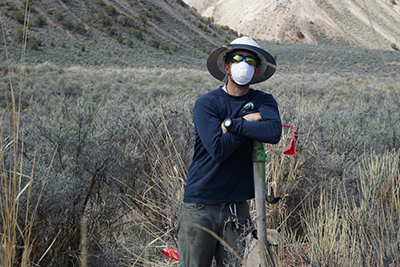
The oil producers that make up about 85 percent of the co-op’s consumer-members turned off electricity to their pumps as the price of oil plummeted to less than $4 a barrel—the result of Americans staying home and driving less. With no power flowing to the wells, the co-op’s electric load dropped nearly 65 percent in just a few weeks.
“All I can do is pray for things to return to normal,” said Jerry King, general manager of the small Columbus-based co-op.
King isn’t the only co-op leader feeling the impact of the pandemic. Not-for-profit co-ops throughout the nation are facing severe budget shortfalls as businesses and factories falter and residential members struggle to pay their bills because of COVID-19 restrictions.
NRECA and its member co-ops have launched a grassroots campaign to appeal to Congress to provide a financial safety net for hard-hit co-ops and their members as lawmakers negotiate the latest coronavirus relief bill.
Here’s a look at what some co-ops are facing.
Unpaid Bills Mount
In Mississippi, about 90 percent of the members of Coast Electric Power Association typically pay their electric bills on time. But as job losses mounted during the pandemic, that number sank to 50 percent by May 5, said Ron Barnes, CEO of the Bay Saint Louis-based co-op. The co-op is facing about $5 million in lost revenue if the bills remain unpaid.
“There are people who have filed for unemployment who have never filed in their lives,” Barnes said. “This isn’t something that was their fault.”
The co-op’s Gulf Coast territory has been devastated by the loss of tourism during the pandemic, leading to heavy layoffs that could get worse if summer travelers stay home.
“If we lose the summer, then our biggest concern of all is bankruptcies,” Barnes said.
Similarly, in North Carolina, member accounts with unpaid bills that are 60 days old or more have increased nearly 50 percent in a month’s time, said Curtis Wynn, president and CEO of Roanoke Electric Cooperative.
Members with prepay accounts are also racking up balances at a record rate. The co-op, which serves one of the poorest areas in the nation, has waived the penalties and late fees that it would normally charge.
That all adds up to more than 7.5 percent of the average monthly revenue for the Aulander-based co-op, Wynn said. He fears things will get worse because of the growing unemployment rate among the co-op’s members, who have lost jobs as restaurants, barbershops and salons have closed.
Co-ops Helping Members
Despite their own financial struggles, co-ops are taking action to help members pay their bills.
Roanoke’s board of directors voted to retire about three times the amount of capital credits it normally would, providing $1.5 million in refunds to members to use to pay their bills.
“I think it’s important that the co-op play a major role in trying to help them get through this,” Wynn said.
In neighboring South Carolina, Berkeley Electric Cooperative returned nearly $5 million in security deposits to its members, who are losing tourism jobs in the Charleston area during the pandemic. The number of delinquent member accounts has nearly doubled from the usual rate of about 10 percent, said Dwayne Cartwright, president and CEO of the Moncks Corner-based co-op.
Some co-op members wept when Farmers’ Electric Cooperative announced in April that it would return $3.3 million, or 100 percent, of its 2019 capital credits. The payments will cover an entire month’s electric bill for most of the Clovis, New Mexico-based co-op’s 7,000 members, with money left over for the following month, said General Manager Lance Adkins.
“Our board wanted to give as much back as possible at a time when it would make the most difference for the members,” Adkins said. “We’re all neighbors.”
“Our board wanted to give as much back as possible at a time when it would make the most difference for our members. We’re all neighbors.” – Lance Adkins, General Manager, Farmers’ Electric Cooperative
Hoping for Better Times
In Colorado, Holy Cross Energy’s electricity sales fell 10 percent in March and April compared with a year ago as ski resorts in Vail and Aspen closed early and seasonal residents were ordered by local governments to return to their primary homes, said CEO Bryan Hannegan.
The co-op’s call center has been getting double the normal number of calls from members who have been laid off from restaurants, hotels and other businesses and can’t pay their bills. As the Glenwood Springs-based co-op arranges payment plans, it’s also offering 1.5 million in capital credits and $500,000 in its Pandemic Payment Assistance Fund to members to help them pay their bills.
Holy Cross will use savings to make up for revenue shortfalls in March, April, May and possibly beyond. But the money won’t last all year, and Hannegan is hopeful that the ski resorts will be back up and running by winter.
Meanwhile, the best way for Congress to help is to provide stimulus funds to co-ops to make up for members’ non-payment of bills, he said.
“We’re co-ops; we’re not in this to make a buck,” Hannegan said. “Right now, our members need our compassion, our support, our assistance.”


